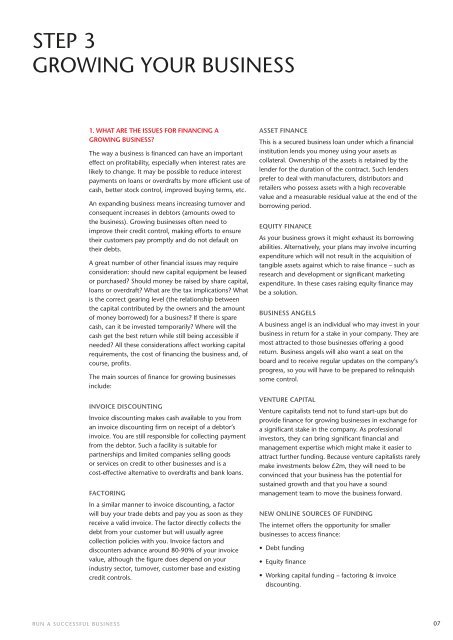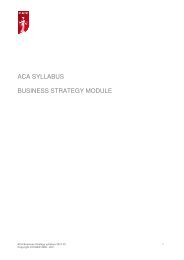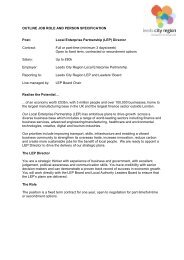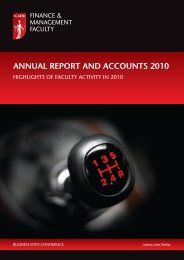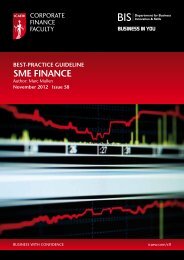RUN A SUCCESSFUL BUSINESS - ICAEW
RUN A SUCCESSFUL BUSINESS - ICAEW
RUN A SUCCESSFUL BUSINESS - ICAEW
You also want an ePaper? Increase the reach of your titles
YUMPU automatically turns print PDFs into web optimized ePapers that Google loves.
STEP 3<br />
GROWING YOUR <strong>BUSINESS</strong><br />
1. WHAT ARE THE ISSUES FOR FINANCING A<br />
GROWING <strong>BUSINESS</strong>?<br />
The way a business is financed can have an important<br />
effect on profitability, especially when interest rates are<br />
likely to change. It may be possible to reduce interest<br />
payments on loans or overdrafts by more efficient use of<br />
cash, better stock control, improved buying terms, etc.<br />
An expanding business means increasing turnover and<br />
consequent increases in debtors (amounts owed to<br />
the business). Growing businesses often need to<br />
improve their credit control, making efforts to ensure<br />
their customers pay promptly and do not default on<br />
their debts.<br />
A great number of other financial issues may require<br />
consideration: should new capital equipment be leased<br />
or purchased? Should money be raised by share capital,<br />
loans or overdraft? What are the tax implications? What<br />
is the correct gearing level (the relationship between<br />
the capital contributed by the owners and the amount<br />
of money borrowed) for a business? If there is spare<br />
cash, can it be invested temporarily? Where will the<br />
cash get the best return while still being accessible if<br />
needed? All these considerations affect working capital<br />
requirements, the cost of financing the business and, of<br />
course, profits.<br />
The main sources of finance for growing businesses<br />
include:<br />
INVOICE DISCOUNTING<br />
Invoice discounting makes cash available to you from<br />
an invoice discounting firm on receipt of a debtor’s<br />
invoice. You are still responsible for collecting payment<br />
from the debtor. Such a facility is suitable for<br />
partnerships and limited companies selling goods<br />
or services on credit to other businesses and is a<br />
cost-effective alternative to overdrafts and bank loans.<br />
FACTORING<br />
In a similar manner to invoice discounting, a factor<br />
will buy your trade debts and pay you as soon as they<br />
receive a valid invoice. The factor directly collects the<br />
debt from your customer but will usually agree<br />
collection policies with you. Invoice factors and<br />
discounters advance around 80-90% of your invoice<br />
value, although the figure does depend on your<br />
industry sector, turnover, customer base and existing<br />
credit controls.<br />
ASSET FINANCE<br />
This is a secured business loan under which a financial<br />
institution lends you money using your assets as<br />
collateral. Ownership of the assets is retained by the<br />
lender for the duration of the contract. Such lenders<br />
prefer to deal with manufacturers, distributors and<br />
retailers who possess assets with a high recoverable<br />
value and a measurable residual value at the end of the<br />
borrowing period.<br />
EQUITY FINANCE<br />
As your business grows it might exhaust its borrowing<br />
abilities. Alternatively, your plans may involve incurring<br />
expenditure which will not result in the acquisition of<br />
tangible assets against which to raise finance – such as<br />
research and development or significant marketing<br />
expenditure. In these cases raising equity finance may<br />
be a solution.<br />
<strong>BUSINESS</strong> ANGELS<br />
A business angel is an individual who may invest in your<br />
business in return for a stake in your company. They are<br />
most attracted to those businesses offering a good<br />
return. Business angels will also want a seat on the<br />
board and to receive regular updates on the company’s<br />
progress, so you will have to be prepared to relinquish<br />
some control.<br />
VENTURE CAPITAL<br />
Venture capitalists tend not to fund start-ups but do<br />
provide finance for growing businesses in exchange for<br />
a significant stake in the company. As professional<br />
investors, they can bring significant financial and<br />
management expertise which might make it easier to<br />
attract further funding. Because venture capitalists rarely<br />
make investments below £2m, they will need to be<br />
convinced that your business has the potential for<br />
sustained growth and that you have a sound<br />
management team to move the business forward.<br />
NEW ONLINE SOURCES OF FUNDING<br />
The internet offers the opportunity for smaller<br />
businesses to access finance:<br />
• Debt funding<br />
• Equity finance<br />
• Working capital funding – factoring & invoice<br />
discounting.<br />
<strong>RUN</strong> A <strong>SUCCESSFUL</strong> <strong>BUSINESS</strong> 07


